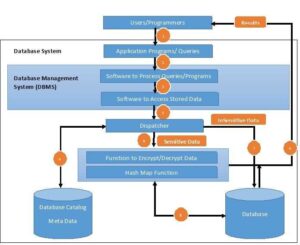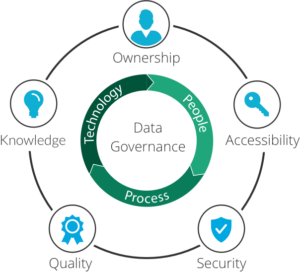Creating safer and healthier environment
Data Governance Consulting
In today’s data-driven world, organizations across industries are recognizing the paramount importance of data governance. With the exponential growth of data volumes and the increasing complexity of regulatory environments, effective data governance is no longer a luxury but a strategic imperative. However, navigating the intricacies of data governance can be daunting without the right expertise and guidance.
في عالم اليوم الذي يعتمد على البيانات، تدرك المؤسسات عبر الصناعات الأهمية القصوى لإدارة البيانات. ومع النمو المتسارع لأحجام البيانات والتعقيد المتزايد للبيئات التنظيمية، لم تعد الإدارة الفعالة للبيانات ترفًا بل أصبحت ضرورة استراتيجية. ومع ذلك، فإن التعامل مع تعقيدات إدارة البيانات يمكن أن يكون أمرًا شاقًا بدون الخبرة والتوجيه المناسبين.
اضغط هنا للعربية
Understanding Data Governance
Data governance encompasses the processes, policies, standards, and metrics that ensure effective management, quality, and security of an organization’s data throughout its lifecycle. At its core, data governance aims to establish accountability, transparency, and consistency in how data is managed and utilized across the organization.
The Importance of Data Governance
- Compliance and Risk Mitigation: Data governance helps organizations comply with regulatory requirements such as GDPR, CCPA, HIPAA, and others. By implementing robust data governance practices, organizations can mitigate risks associated with data breaches, privacy violations, and non-compliance penalties.
-
Data Quality and Integrity: Poor data quality can have significant ramifications, including erroneous decision-making and reputational damage. Data governance ensures data accuracy, consistency, and completeness, thereby enhancing trust in organizational data assets.
-
Cost Optimization: Effective data governance streamlines data management processes, reduces redundancies, and minimizes data silos. This leads to cost savings through improved operational efficiency and resource utilization.
-
Strategic Decision-Making: Well-governed data provides executives and decision-makers with reliable insights for strategic planning, forecasting, and performance evaluation. Data governance facilitates a culture of data-driven decision-making across the organization.
Key Components of Data Governance
- Data Stewardship: Assigning accountability for data assets and defining roles and responsibilities for data management activities.
-
Data Quality Management: Establishing standards and procedures to ensure data accuracy, completeness, consistency, and timeliness.
-
Metadata Management: Capturing and maintaining metadata to provide context, lineage, and understanding of data assets.
-
Data Security and Privacy: Implementing measures to protect sensitive data from unauthorized access, breaches, and misuse while ensuring compliance with relevant regulations.
-
Data Lifecycle Management: Managing data from creation to archival or disposal, including data retention policies and procedures.
The Role of Data Governance Consulting
The Role of Data Governance Consulting
Data governance consulting offers organizations specialized expertise, methodologies, and best practices to develop and implement effective data governance frameworks tailored to their unique needs and challenges. Consultants work closely with stakeholders to assess existing capabilities, define governance objectives, and design governance structures that align with organizational goals.
Benefits of Data Governance Consulting
- Accelerated Implementation: Consultants bring in-depth knowledge and experience, expediting the implementation of data governance initiatives and reducing time-to-value.
-
Customized Solutions: Consultants tailor data governance frameworks to address specific organizational requirements, industry regulations, and technology landscapes.
-
Change Management Support: Consultants provide guidance and support for change management efforts, facilitating organizational buy-in and adoption of data governance practices.
-
Continuous Improvement: Data governance consultants help establish mechanisms for ongoing monitoring, measurement, and refinement of governance processes to adapt to evolving business needs and regulatory requirements.

Design of Data Architecture
Design of Data Architecture () Data Governance Consulting The process by which an…

Implementation of Data Governance based on
Implementation of Data Governance based on Standards () Data Governance Consulting The process…

Master data and Reference Data
Master Data & Reference Data () Data Governance Consulting The process by which…

Maturity Assessment
Maturity Assessment () Data Governance Consulting The process by which an individual determines…

Training for Data Governance
Training for Data Governance () Data Governance Consulting Contact Us OrientMCTTraining for Data…
Conclusion
In an era defined by data abundance and complexity, data governance emerges as a cornerstone of organizational success. By embracing data governance principles and leveraging the expertise of data governance consultants, organizations can unlock the full potential of their data assets, drive innovation, and gain a competitive edge in the digital landscape.
For organizations seeking to embark on or enhance their data governance journey, partnering with experienced consultants can pave the way for sustainable data governance excellence and ensure long-term value creation from data assets.
